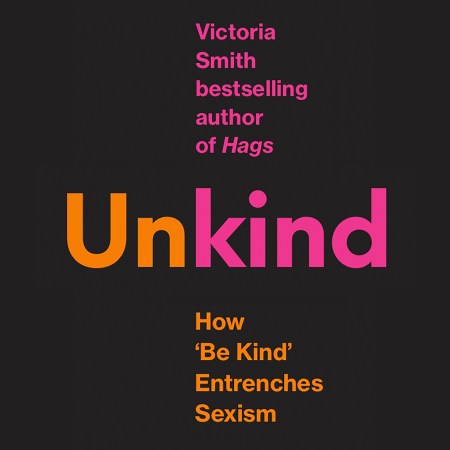‘Erudite, blisteringly smart and profoundly compassionate… A must-read for anyone hungry to understand the origins and dangers of contemporary exhortations to women to #BeKind, and for everyone who wants to live a feminist life’ Dr Rachel Hewitt
A brilliantly witty and insightful analysis of how kindness culture is used against women.
Using the #JustBeKind trend of the 2020s as a starting point, (Un)kind explores how traditional beliefs about women’s ‘kind’ nature have been repackaged for an age that remains dependent – socially, politically, economically – on female self-sacrifice while finding the concept outdated and essentialist.
Looking at the various guises under which kindness culture is sold to women and girls – from play to self-help, social justice activism to empowerment – Victoria Smith argues that the pressure on women and girls has not decreased, but instead been incorporated into the ‘work’ of feminism. (Un)kind analyses the way in which this phenomenon ultimately distorts relationships, harming not just those coerced into performing ‘kindness work’ but the supposed recipients of their services.
Kindness culture supports the backlash against feminism while claiming to represent feminism’s – and women’s – true nature. It is, at heart, unkind.
PRAISE FOR HAGS
‘The greatest joy of Hags is its lively erudition . . . eloquent, clever and devastating’ The Times
‘A book that could not be more necessary’ Observer
‘Brilliantly witty, engaging and insightful’ Scotsman
A brilliantly witty and insightful analysis of how kindness culture is used against women.
Using the #JustBeKind trend of the 2020s as a starting point, (Un)kind explores how traditional beliefs about women’s ‘kind’ nature have been repackaged for an age that remains dependent – socially, politically, economically – on female self-sacrifice while finding the concept outdated and essentialist.
Looking at the various guises under which kindness culture is sold to women and girls – from play to self-help, social justice activism to empowerment – Victoria Smith argues that the pressure on women and girls has not decreased, but instead been incorporated into the ‘work’ of feminism. (Un)kind analyses the way in which this phenomenon ultimately distorts relationships, harming not just those coerced into performing ‘kindness work’ but the supposed recipients of their services.
Kindness culture supports the backlash against feminism while claiming to represent feminism’s – and women’s – true nature. It is, at heart, unkind.
PRAISE FOR HAGS
‘The greatest joy of Hags is its lively erudition . . . eloquent, clever and devastating’ The Times
‘A book that could not be more necessary’ Observer
‘Brilliantly witty, engaging and insightful’ Scotsman
Newsletter Signup
By clicking ‘Sign Up,’ I acknowledge that I have read and agree to Hachette Book Group’s Privacy Policy and Terms of Use
Reviews
(Un)kind is erudite, blisteringly smart and profoundly compassionate towards those who need it most: women. With subtlety and elegance, Victoria Smith reveals how, throughout history, women have been trained to provide kindness to others while quashing our own needs; and she deftly teases out the difficult question of how feminists can still believe that caring for one another is a social good without being exploited in the process. A must-read for anyone hungry to understand the origins and dangers of contemporary exhortations to women to #BeKind, and for everyone who wants to live a feminist life
